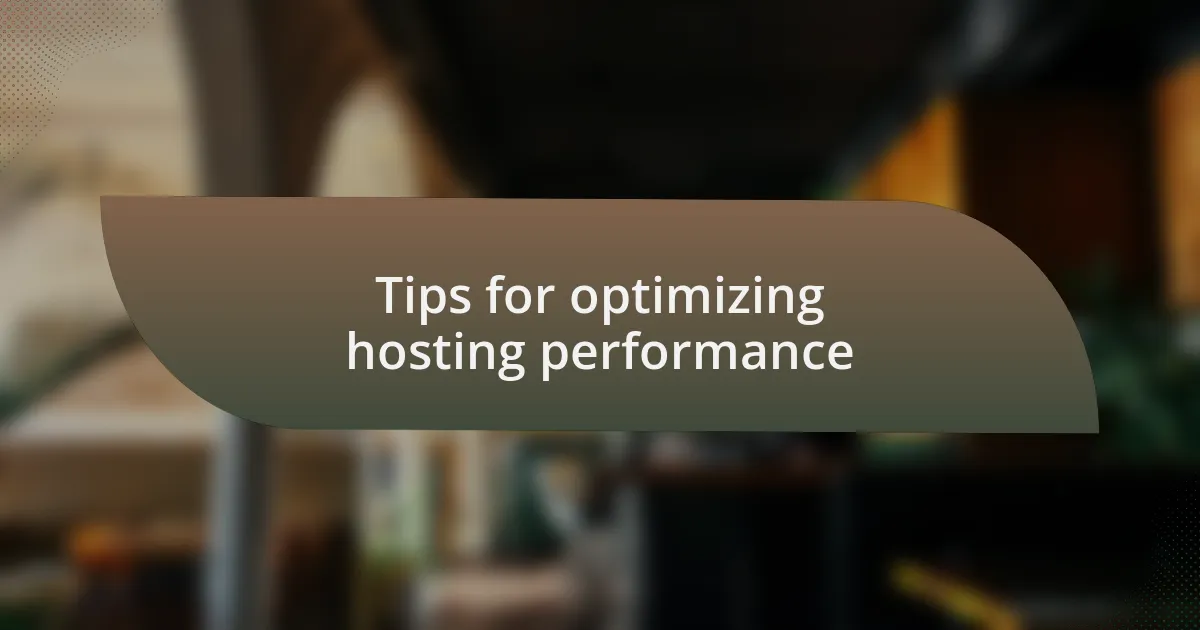Key takeaways:
- Choosing the right type of web hosting (shared, VPS, dedicated, cloud) is crucial and can significantly impact website performance and growth potential.
- Different hosting providers offer varying features, with user-friendly interfaces and customer support being key factors in choosing the right one.
- For developers, platforms like VPS (Linode), AWS, and Heroku offer varying levels of control and scalability, catering to different needs and expertise levels.
- Optimizing hosting performance involves factors such as server location, regular monitoring of resource usage, and implementing caching strategies to enhance user experience.

Understanding web hosting basics
When I first dove into web hosting, I was taken aback by how it can shape your website’s success. It’s not just about the technical specs; it’s about finding a host that aligns with your needs. Have you ever wondered why some websites load faster than others? Often, it boils down to the hosting provider.
Understanding the different types of web hosting—shared, VPS, dedicated, and cloud—can feel overwhelming. I remember grappling with this choice early on. Each option offers distinct advantages and drawbacks, making it essential to assess your website’s size and growth potential. Isn’t it daunting to think that the wrong choice could affect your site’s performance?
I recall a particular instance when I opted for shared hosting to save costs. Initially, it seemed like a smart move, but I quickly learned that limitations in resources could stifle my site’s growth. This experience taught me the importance of scaling your hosting solution along with your business needs. How about you? Have you encountered similar challenges?

Types of web hosting services
When diving into web hosting, the first major type you’ll encounter is shared hosting. This setup allows multiple websites to share a single server, which can be cost-effective for beginners. I remember my first attempt with shared hosting—I was thrilled by the low price, but soon realized that the performance could lag during peak traffic times. Have you ever noticed your favorite site loading slower when too many users are online? That’s the reality of shared hosting.
Then there’s VPS (Virtual Private Server) hosting, which offers more power and flexibility. Unlike shared hosting, a VPS allocates a portion of a server’s resources to you, which means better performance and customization options. I opted for VPS when my traffic began to grow, and it felt liberating to have that control and dedicated space. It’s like moving from a busy apartment to a spacious home where you can finally breathe.
Dedicated hosting takes it a step further, providing an entire server just for your site. This path has its benefits, particularly for high-traffic sites that demand maximum performance. However, managing a dedicated server can be daunting; I learned this the hard way when I faced the complexities of server management without prior knowledge. Have you ever felt overwhelmed by a decision that requires significant technical know-how? That’s how I felt when choosing dedicated hosting.

Comparing popular hosting providers
When it comes to comparing popular hosting providers, I’ve often been fascinated by how different features can sway my decision. For instance, while Bluehost is widely known for its user-friendly interface, I found SiteGround’s superior customer service to be a game-changer during my early web development days. Have you ever struggled with a technical issue in the middle of the night? The peace of mind that comes with responsive support can’t be overstated.
Another name that frequently pops up in discussions is HostGator, which caught my eye due to its affordable plans. However, after testing it out, I realized that the performance sometimes fell short during high-demand periods. I still remember that nail-biting moment when my site slowed down just as I launched a new feature. I learned my lesson: not all budget options deliver the reliability needed for a growing project.
Then there’s DigitalOcean, which, in my experience, caters more to developers looking for advanced features and scalability. Their cloud infrastructure allows for easy scaling as traffic grows, but I must admit, the initial learning curve was steep. Have you considered diving into cloud hosting? If you’re looking for flexibility and control, it can be an incredibly rewarding investment.

Recommended hosting choices for developers
When recommending hosting choices for developers, I often think back to my first experience with VPS (Virtual Private Server) hosting. I found that using a platform like Linode not only boosted my control over the environment but also provided the power I needed for resource-intensive applications. There’s something incredibly satisfying about having that level of customization; it’s like building your own digital workspace.
Another solid choice is AWS (Amazon Web Services) for those who are ready to tackle its complexity. I remember feeling overwhelmed during my initial setup, but once I got the hang of it, the scalability it offers was impressive. The flexibility to launch services and allocate resources on demand has transformed the way I approach project deployment. Have you ever thought about how a scalable infrastructure could change the trajectory of your projects?
For those just starting or looking for more straightforward solutions, I highly recommend looking into Heroku. The platform’s ability to simplify deployment processes saved me countless hours in the early stages of my development journey. It was a relief to focus on writing code rather than managing servers. Isn’t it nice to know that you can get a project up and running without diving deep into server management?

Tips for optimizing hosting performance
When it comes to optimizing hosting performance, I’ve learned that choosing the right server location can have a significant impact. I once moved a project to a server closer to our primary users, and the difference in load times was remarkable. Have you ever experienced frustration waiting for a site to load? Choosing an optimal location can turn that hassle into a seamless experience.
Another crucial tip is to regularly monitor resource usage. In one project, I wasn’t keeping an eye on CPU and memory allocations, which led to unexpected downtime during peak traffic. It’s a tough lesson, but knowing when to scale your resources means you can keep your site running smoothly and maintain user trust.
Caching is an often-overlooked strategy that I’ve seen work wonders. In my case, implementing a simple caching mechanism reduced server load significantly and improved response times. Isn’t it fascinating how a little optimization can lead to such a big impact? A well-tuned cache can make all the difference in delivering a responsive user experience.